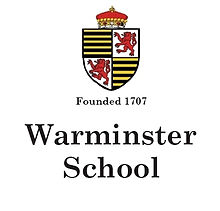Warminster School
 |
|
| Established | 1707 |
|---|---|
| Type | Independent day and boarding |
| Religion | Church of England |
| Headmaster | Mark Mortimer |
| Founder | Thomas Thynne, 1st Viscount Weymouth |
| Location |
Warminster Wiltshire BA12 8PJ England Coordinates: 51°12′29″N 2°11′20″W / 51.208°N 2.189°W |
| DfE number | 865/6009 |
| Students | 600~ |
| Gender | Mixed |
| Ages | 3–18 |
| Houses | Ken, Denys, Arnold |
| Colours | |
| Former Pupils | Old Verlucians [1] |
| Website | www |
Warminster School, originally called Lord Weymouth's Grammar School, is a co-educational independent day and boarding school at Warminster, Wiltshire, for students aged three to eighteen. It now comprises the Preparatory School for pupils aged three to eleven, and the Senior School for students aged eleven to eighteen
The school's buildings lie in grounds which face open country on the edge of the Warminster town centre. The school has long-established links with the town and enjoys strong support. The Preparatory School is on a neighbouring site.
In 1707, Thomas Thynne, 1st Viscount Weymouth, under the influence of Bishop Thomas Ken (1637–1711), founded a grammar school for boys in the market town of Warminster, near to his family seat of Longleat, to teach the boys of Warminster, Longbridge Deverill, and Monkton Deverill Latin, Mathematics, and other subjects of the usual syllabus of the day. This became known as Lord Weymouth's Grammar School - referred to locally as the "Latin School" - and by the 20th century was called The Lord Weymouth School.
Lord Weymouth (1640–1714) was descended from the first Sir John Thynne of Longleat House. In 1673 he married Lady Francis Finch, a daughter of the Earl of Winchelsea, and lived at Drayton Basset, near Tamworth. He was Member of Parliament for the University of Oxford (1674–1679), and High Steward of Tamworth in 1679. In 1680 he was created Baron Thynne and in 1682 Viscount Weymouth. He was High Steward of the Royal Town of Sutton Coldfield from 1679 to 1714. His three sons all predeceased him.
...
Wikipedia
